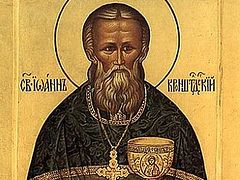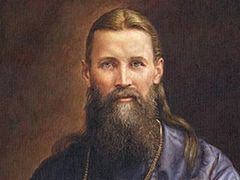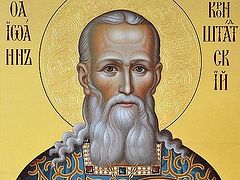When in 1898 Alexander Zhadanovsky[1] was faced with the important question about choosing his life’s path, he wrote a letter to Fr. John of Kronstadt, not even counting on receiving an answer. Nevertheless, batiushka answered, blessing the young man to become a monk—something he was leaning toward himself. This letter decided his fate. When he was already the abbot of the Chudov Monastery, Bishop Arseny was often able to meet with the Kronstadt luminary, concelebrate and talk with him. Remembrances of the holy pastor are preserved in many of Bishop Arseny’s notes and publications.
Divine Services
Fr. John of Kronstadt had an especially reverent and devout relationship to the divine services. As we know, even at the very beginning of his pastoral service he made it his rule to serve Divine Liturgy every day. This was the main source from which his heart, which thirsted for God, was fed and filled. Each time he served, batiushka approached the Liturgy with unfailing contrition, and almost always with tears in his eyes.
Bishop Arseny noted that serving with Fr. John and receiving Communion with him was a great joy and consolation for everyone:
It was very consoling to receive Communion of the Holy, Life-creating Mysteries at his service. And we had to as if hurry in order not to lose the chance to make use of the opportunity to partake of the Heavenly Table with him. And if this usually requires great preparation (in the sense of time), great abstinence (in the sense of fasting), then with him the entire center of gravity was in the spiritual inspiration, the spiritual freedom. This is the quality of God’s grace, in that it pours out not on external righteousness, but on a humble heart, freely repenting and loving the Lord.
“Whether Fr. John served, he would enter entirely into contemplation of the Lord; he saw Him as if standing before him and active,” wrote Bishop Arseny. How did batiushka attain such a living standing before the Living God? Before he would begin to celebrate every Liturgy he would fall down before the altar of the Lord and secretly confess and pray until he felt that the Lord had forgiven him.
At Bishop Arseny’s question about what helps him concentrate on the Divine Liturgy, Fr. John replied:
For this it is necessary to enter into the spirit of the divine service from the very beginning. That is why I almost always try to serve the proskimedia[2] myself, for it is the threshold of the Liturgy, and it must never be ignored.
Batiushka experienced every part, every movement of the service as something living and presently happening; he entered into “mental contemplation of the Heavenly Church.”
Thus begins the Liturgy, and I strive not to lose the thread, not to be distracted by unrelated thoughts, but to experience with my heart all that is remembered, and endured, and created at the Divine Liturgy.
Many who concelebrated with him noticed that in these moments how Fr. John was transfigured in a marvelous way, to the point of unrecognizability. Tears very often appeared in his eyes. “Then one could feel the strength of his prayer and closeness to the Lord”, noted Bishop Arseny. These tears were filled with grace, and batiushka himself admitted that such tears to not harm the vision, as opposed to the tears of “worldly sorrow”.
Fr. John experienced particular awe before the Lamb after the Transubstantiation of the Holy Gifts. He bowed over them and could not cease his tears of gratitude. “He was at that time like a child who cuddles up to his mother, entrusting his childlike joys and sorrows, knowing that his mother will listen to him and will not turn him away,” recalls Bishop Arseny.
When Fr. John carryied out the Chalice to commune the faithful, the people would usually press forward. Batiushka behaved very strictly with the communicants, and he in no way allowed everyone to commune, seeing and rebuking many who were not worthy. Sometimes he would return to the altar, saying that he would not commune any longer.
After every Liturgy Fr. John of Kronstadt always gave an instructive homily, which he had scrupulously prepared ahead of time, making notes. Before the sermon he always prayed: “Lord, help me to say a word for the benefit of the listeners.” After Divine Liturgy batiushka liked to be alone in order to more deeply and consciously experience his solitude with the Lord. During those times he would read the Gospel, and give himself over to divine contemplation.
Fr. John’s faith
Truly amazing was the strength of Fr. John’s faith. It could be said that this faith was the main reason why such an abundance of the gifts of God’s grace poured out upon the Kronstadt pastor. Bishop Arseny wrote about this:
All of Fr. John’s strength consisted in his authentic, living, and active faith in Christ the Savior and His teaching and in his total penetration into this teaching, which became his native and eternal element; his true knowing, in the words of the apostle, and not just cold knowledge. He believed without the least doubt. It could be said that he strengthened himself in faith; he spoke and thought about whatever related to faith not as something passed along to him, but as if personally experienced and seen. When he spoke of something spiritual, one could feel that he spoke like an eyewitness. <…> Fr. John was so fortified in faith that he was completely penetrated with spiritual contemplation and could say with the apostle: ‘No longer is it I that live, but Christ Who lives in me’.”
Bishop Arseny also cites one example of Fr. John’s sincere and undoubting faith. One day, when Batiushka had come to him in Chudov Monastery, Vladyka brought out to him one of the monastery’s holy objects—a Gospel inscribed by the hand of St. Alexiy of Moscow. Batiushka immediately fell down before the holy book without asking about its authenticity, and kissed it, touching it to his head, exclaiming, “What happiness I have today—I see and kiss the great holy hierarch’s own manuscript.”
However, Fr. John did not attain this faith right away. Batiushka himself admitted that often in his youth he had to experience unbelievable heaviness of soul, when God’s grace had abandoned him. But then he did not give up and continued praying with these words: “You, O Lord, abandon me for my sins, but I will not go away from You and will relentlessly pray for mercy.”
But Fr. John received his amazing gift of faith not only for his dedication and constancy. He earned it through daily, ceaseless work on himself, and first of all by attentiveness to his life, his inner experiences. This labor went on all his life. Batiushka noticed every movement of his soul and strove to analyze it; he watched whether he had been angered at anyone or judged, and would immediately repent with sincerity if he noticed even his tiniest sin.
Examples of such deep inner work on oneself can be found in Fr. John of Kronstadt’s journal entries, which have come down to us [as the book, My Life in Christ]. Vladyka Arseny preserved a small portion of the unpublished notes. In them we can notice how vigilant Fr. John was over himself, even in minutiae. It would happen that unrelated thoughts of judgment against someone would come to him even during services, and he could only continue calmly serving after offering deep inner repentance. It is particularly astounding in these notes how vitally Fr. John reacted to everything. He felt that in moments of anger or irritation grace would leave him, and he always strove to bring it back through repentance. Only then could he calm down inwardly and continue what he was doing.
Fr. John also constantly revitalized his faith through daily reading of the Gospels and Epistles, the lives of the saints whose memory was celebrated on a given day, and the service to that saint according to the Menaion. In his final years of life, as Bishop Arseny Zhadanovsky noted, Fr. John was very interested in reading the books of the prophets. The reading of Holy Scripture itself, in Batiushka’s own words, was something he experienced differently in his later years from what he experienced in his youth:
Sometimes I would read the Holy Gospel and my heart would be cold, with much slipping by my attention. Now when I read it, I can say to you right out, spiritual ecstasy enraptures my heart—so palpable is the presence of grace in God’s Word. It even seems to me that I read it and drink in God’s grace.
Vladyka Arseny also noted how free and natural was it for Fr. John to express his religious feelings. After all, it often happened that even pastors were embarrassed to show their faith to those around them. With Fr. John of Kronstadt it was all different. Vladyka cited one example that he remembered. One day he and Fr. John had to wait a long time at the Moscow train station for a train that was behind schedule. Then Batiushka excused himself before those present, saying that since he was to serve the Liturgy the next day, he had to read the preparatory prayer rule. Then he read the canons right there from memory, without any shyness or attention to the surrounding atmosphere.
Batiushka loved nature, and he found causes in it for divine contemplation. Every drop of rain, every leaf, every blade of grass seemed precious in his sight, and he saw the invisible hand of the Creator in all of it.
Influence on people
The most noticeable thing about Fr. John’s personality was his ability to almost immediately build a good relationship with any person. Batiushka never made any particular effort on his own part, but there was something special in his very appearance that always evoked trust and openness in anyone he talked with. Vladyka Arseny mentions this in his notes:
Fr. John’s outward appearance itself was special, somehow charming, involuntarily drawing everyone’s heart to him. In his eyes was reflected heaven, in his face, compassion for people, and in his manner, the desire to help each person.
Also reflected in Batiushka’s outward appearance was his constant inclination towards spiritual contemplation. Even in his youth, in Vladyka’s words, Fr. John on his way to and from the church would always direct his gaze upward and raise his hands to the heavens in prayer. This made many, including other clergymen with whom he served, think that he was not normal. Fr. John was even called in a number of times for talks with his ruling hierarch for such unusual, visible manifestations of his living faith. This testifies to how Batiushka even then involuntarily stood out amongst other ordinary priests.
With time, when Fr. John had become a famous pastor, it was impossible to imagine him in any other way than surrounded by a large crowd of people trying to get close to him, although he also loved solitude. Vladyka Arseny found the main reason for this effect on people in the grace that rested abundantly upon Fr. John and poured through him onto people around him. But even the Kronstadt pastor himself never related to any person in any other way than as to a precious, holy shrine:
Batiushka always tried to have a holy, serious relationship to God and neighbor. We often talk superficially on subjects of faith, but are insincere and spiteful towards people. But the Kronstadt luminary burned in spirit for the Lord, and he saw His image in every person; that is why he treasured, respected, and loved each one.
Vladyka Arseny also noted Fr. John’s extraordinary hospitality. He would seat every new guest at his dinner table and try to give attention to each, often serving the table himself. Then Vladyka would note also Batiushka’s extraordinary guilelessness. “Apparently he would be angry at times, but it would be very fleeting, and more from his fervent heart and fiery soul than from any ill feelings.”
In Batiushka’s presence, in Vladyka Arseny’s words, the entire atmosphere would immediately become holy; any idle jokes or conversations, any unruliness would have been unimaginable in his presence. Vladyka wrote:
My impressions from spending tie with Fr. John of Kronstadt were inexpressible. He was truly a Gospel bridegroom—one felt so light, so spiritually free with him!
Vladyka compared Fr. John’s effect upon those around him to the effect of a miracle-working icon on a person’s soul, when all “low, trifling interests retreated to the background, and the soul was filled only with the exalted, the heavenly. Everything united into a bright disposition of soul, and there came a mighty wave of religious feeling.”
Fr. John related with great love and attention to all, without any distinction of class or wealth. Vladyk Arseny wrote in his notes about one clear example. One day in Petersburg a drunkard who had fallen to the very bottom of life passed by the train station, where he saw a huge crowd of people. He learned that all those people were waiting for the arrival of Fr. John of Kronstadt. Purely out of curiosity that man decided to also go and have a look at this priest whom everyone was waiting to meet. When Fr. John disembarked from the train, he greeted that drunkard with the most affectionate words and blessed him, guessing that behind his outward appearance were many sufferings. These caressing words so stunned the desperate man that he soon came to Fr. John at church himself, and with time was completely transformed morally and returned to normal life. Such was the power of Righteous John of Kronstadt’s influence on those around him.
The “Johnites”
This extraordinary reverence for Batiushka during his lifetime had, unfortunately, it’s deformities. Everyone knows that at the time there was a group of people with exaggerated veneration for John of Kronstadt. They formed a real sect, which came to be called the “Johnites”. True, a portion of these people were only using Batiushka’s popularity for their own enrichment—by collecting donations supposedly in his name and then keeping it all for themselves. Because Fr. John was famous for his charity work, no one doubted the probability of such fundraising, and people donated freely. Significant sums were gathered.
But other of Batiushka’s “venerators” were under a greater threat, because they considered him to be more than a saint—they thought for instance that he was an incarnation of the Holy Trinity. Obviously this was nothing less than heretical. Such fanatics gave Batiushka the most trouble; they following him around, and stole his things in order to worship them. There were even cases when during divine services someone would bite Fr. John’s finger.
Bishop Arseny had to deal with the “Johnites” more than once. He remembered how one woman wrote to him to reproach him for honoring John of Kronstadt as no more than a pastor, and not as God. And although Fr. John himself was not to blame for this incorrect understanding of his person, he heart was often grieved by this distortion of the faith. Vladyka Arseny was on occasion present during Fr. John’s personal conversation with a representative of the Johnites. Fr. John rebuked them very sternly, called them to repentance, and threatened them with God’s curse if they don’t stop it. And although no one heeded Batiushka’s words then, after his repose, apparently at the righteous man’s prayers, Johnitism quickly fizzled out.
Pastoral service
Fr. John’s pastoral service could best be described by the Gospel words: The good shepherd giveth his life for the sheep (Jn. 10:11). “Fr. John viewed being a pastor as something entrusted to him by the Lord God Himself, and which he did not have the right to refuse,” wrote Vladyka Arseny. If Fr. John approached every thing with the utmost seriousness and attention, then in this respect he completely forgot about himself, sacrificing all for the good of his neighbor, including, as we know, his own family happiness.
Well known for example was Batiushka’s habit of giving his last possessions to anyone, regardless of person. When one of his family tried to reproach him with supposedly excessive extravagance in charity, Fr. John replied, “I am a priest, so what is wrong with it? It means that there’s no more to be said of it—I belong to others and not to myself.” It is also noteworthy that when Batiushka was asked about the reason for his renown and influence on the people, he, as Vladyka Arseny recalls, replied, “I have nothing more than the grace of the priesthood, which every priest receives at ordination. Preserve this fire, and you will do much more, and more gloriously.” In this reply is something more important to us than just the extreme self-deprecation of a great saint—it is sure proof of the power of grace, which to this day pours out abundantly upon the faithful of Christ’s Church and especially upon its pastors. An excellent confirmation of this is the example of Holy Righteous John of Kronstadt himself.




